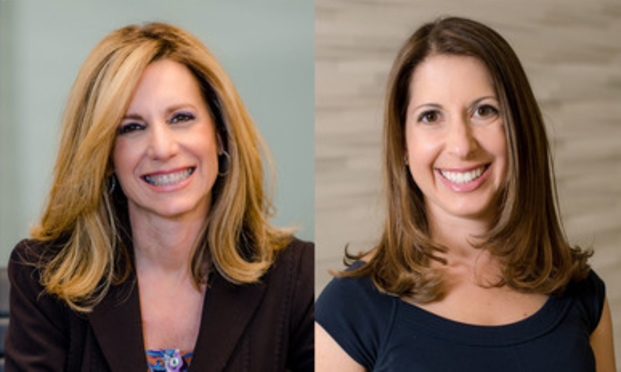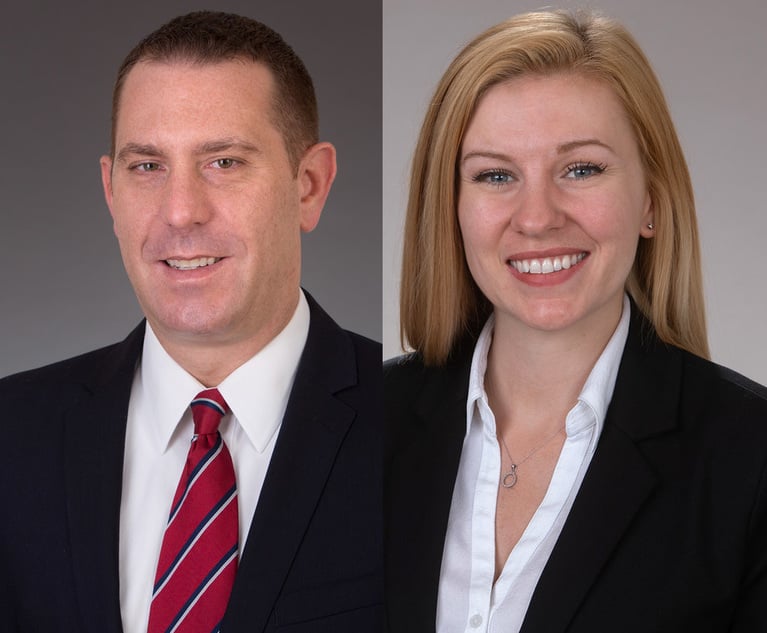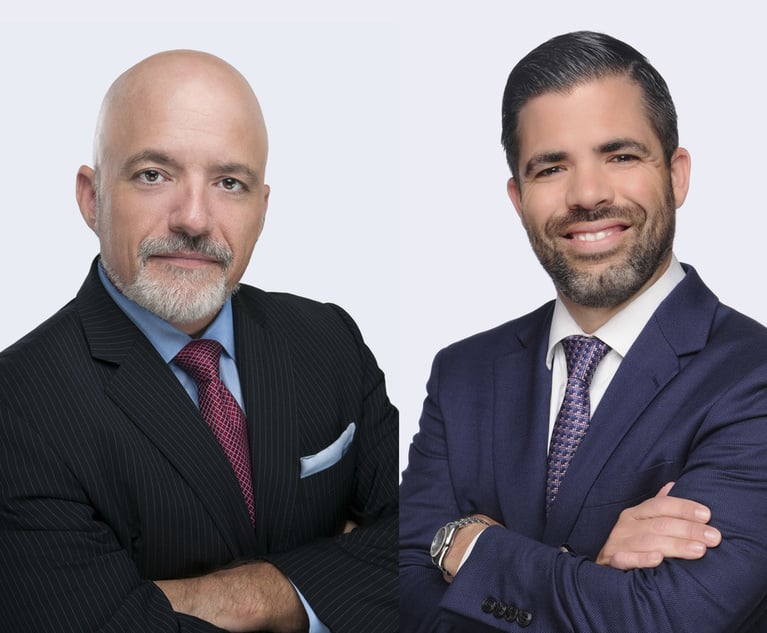'Daubert' Rules in Florida—The Effect on Financial Experts
Expert witness testimony can make or break a case. But, what are the rules governing whether an expert is allowed to testify? For many years, Florida has vacillated on which standard applies to experts. However, the Florida Supreme Court adopted the Daubert standard for expert testimony in Florida courts May 23.
July 29, 2019 at 11:55 AM
4 minute read
 Sheri Fiske Schultz, left, and Katie Gilden, right.
Sheri Fiske Schultz, left, and Katie Gilden, right.
Expert witness testimony can make or break a case. But, what are the rules governing whether an expert is allowed to testify? For many years, Florida has vacillated on which standard applies to experts. However, the Florida Supreme Court adopted the Daubert standard for expert testimony in Florida courts May 23.
Previously, the Florida Evidence Code utilized the Frye standard for admitting expert testimony. Under Frye, also known as the “general acceptance test,” expert opinion based on a scientific technique is not admissible unless the technique is generally accepted as reliable in the field.
In contrast, U.S. federal courts (and most states) have utilized the Daubert standard for decades. Daubert goes beyond the general acceptance test, and considers several other factors, including: whether the methodology has been tested; whether it has been subjected to peer review and publication; and its known or potential rate of error. Under Daubert, the trial court assumes more of a “gatekeeper” role regarding expert testimony. The million dollar question is: How heavy is the hand on the gate?
PriceWaterhouseCoopers (PWC) has studied Daubert challenges to financial expert witnesses for the past 18 years (see “Daubert Challenges to Financial Experts—A Yearly Study of Trends and Outcomes,” 2000-2017, hereinafter referred to as the study). While the Daubert opinion dates back to 1993, in 1999 the U.S. Supreme Court ruled (in Kumho Tire v. Carmichael) that the Daubert criteria were applicable to all types of expert testimony, including financial expert testimony. The PWC study only includes federal court cases which cite Kumho Tire. While this study may be limited, PWC's detailed analysis of Daubert exclusions can provide insights to financial experts and attorneys that may ultimately draw parallels within the Florida court system.
According to PWC's annual study, of the 206 Daubert challenges in 2017, 48% were successful, (meaning the expert was fully excluded or partially excluded). Exclusion rates were the highest in cases involving securities litigation, intellectual property, and fraud. Furthermore, when financial experts were excluded, lack of reliability was the primary reason for exclusion.
So, what does that mean for the CPA acting as an expert witness? Interestingly, there are striking similarities between the professional standards promulgated by the American Institute of Certified Public Accountants (AICPA), and the Federal Rules of Evidence. Terminology utilized in the Federal Rules of Evidence—and now echoed in Florida's Rules of Evidence—include terms such as “reliable” and “sufficient data.” These nomenclatures are the backbone of a CPA's professional standards.
For example, under AICPA General Standards Rule 1.300.001, a member must “obtain sufficient relevant data to afford a reasonable basis for conclusions or recommendations in relation to any professional services performed.”As cited in PWC's study, when the exclusion of a financial expert was due to lack of reliability, courts most frequently cited lack of sufficient data or use of methods that are not generally accepted as the reasons for exclusions. Therefore, it stands to reason that a CPA who is properly adhering to his or her own professional standards would reasonably pass muster under the Daubert standard, now applicable in Florida.
But, what if a financial expert is ultimately excluded? As PWC points out, in the past a Daubert exclusion could mean “the end of the road” for the expert witness. However, there have been several instances in which courts allowed experts to remedy challengeable issues by submitting a revised report. Furthermore, appellate courts agreed less often with the trial courts where the lower court excluded the expert. Meaning, more often courts are leaning towards allowing the expert testimony—allowing flaws to go to the weight of the evidence and be addressed through cross-examination rather than altogether excluding the expert opinion.
Ultimately, a CPA expert witness in Florida should hold fast to her professional standards and be cognizant of the law change in the state. Only time will tell how heavy a hand Florida courts will have under Daubert.
Katie Gilden is a principal in the forensic accounting and litigation services practice at Fiske & Co., a South Florida accounting firm. Sheri Fiske Schultz is managing director at the firm.
This content has been archived. It is available through our partners, LexisNexis® and Bloomberg Law.
To view this content, please continue to their sites.
Not a Lexis Subscriber?
Subscribe Now
Not a Bloomberg Law Subscriber?
Subscribe Now
NOT FOR REPRINT
© 2025 ALM Global, LLC, All Rights Reserved. Request academic re-use from www.copyright.com. All other uses, submit a request to [email protected]. For more information visit Asset & Logo Licensing.
You Might Like
View All



Trending Stories
- 1Ex-Kline & Specter Associate Drops Lawsuit Against the Firm
- 2Am Law 100 Lateral Partner Hiring Rose in 2024: Report
- 3The Importance of Federal Rule of Evidence 502 and Its Impact on Privilege
- 4What’s at Stake in Supreme Court Case Over Religious Charter School?
- 5People in the News—Jan. 30, 2025—Rubin Glickman, Goldberg Segalla
Who Got The Work
J. Brugh Lower of Gibbons has entered an appearance for industrial equipment supplier Devco Corporation in a pending trademark infringement lawsuit. The suit, accusing the defendant of selling knock-off Graco products, was filed Dec. 18 in New Jersey District Court by Rivkin Radler on behalf of Graco Inc. and Graco Minnesota. The case, assigned to U.S. District Judge Zahid N. Quraishi, is 3:24-cv-11294, Graco Inc. et al v. Devco Corporation.
Who Got The Work
Rebecca Maller-Stein and Kent A. Yalowitz of Arnold & Porter Kaye Scholer have entered their appearances for Hanaco Venture Capital and its executives, Lior Prosor and David Frankel, in a pending securities lawsuit. The action, filed on Dec. 24 in New York Southern District Court by Zell, Aron & Co. on behalf of Goldeneye Advisors, accuses the defendants of negligently and fraudulently managing the plaintiff's $1 million investment. The case, assigned to U.S. District Judge Vernon S. Broderick, is 1:24-cv-09918, Goldeneye Advisors, LLC v. Hanaco Venture Capital, Ltd. et al.
Who Got The Work
Attorneys from A&O Shearman has stepped in as defense counsel for Toronto-Dominion Bank and other defendants in a pending securities class action. The suit, filed Dec. 11 in New York Southern District Court by Bleichmar Fonti & Auld, accuses the defendants of concealing the bank's 'pervasive' deficiencies in regards to its compliance with the Bank Secrecy Act and the quality of its anti-money laundering controls. The case, assigned to U.S. District Judge Arun Subramanian, is 1:24-cv-09445, Gonzalez v. The Toronto-Dominion Bank et al.
Who Got The Work
Crown Castle International, a Pennsylvania company providing shared communications infrastructure, has turned to Luke D. Wolf of Gordon Rees Scully Mansukhani to fend off a pending breach-of-contract lawsuit. The court action, filed Nov. 25 in Michigan Eastern District Court by Hooper Hathaway PC on behalf of The Town Residences LLC, accuses Crown Castle of failing to transfer approximately $30,000 in utility payments from T-Mobile in breach of a roof-top lease and assignment agreement. The case, assigned to U.S. District Judge Susan K. Declercq, is 2:24-cv-13131, The Town Residences LLC v. T-Mobile US, Inc. et al.
Who Got The Work
Wilfred P. Coronato and Daniel M. Schwartz of McCarter & English have stepped in as defense counsel to Electrolux Home Products Inc. in a pending product liability lawsuit. The court action, filed Nov. 26 in New York Eastern District Court by Poulos Lopiccolo PC and Nagel Rice LLP on behalf of David Stern, alleges that the defendant's refrigerators’ drawers and shelving repeatedly break and fall apart within months after purchase. The case, assigned to U.S. District Judge Joan M. Azrack, is 2:24-cv-08204, Stern v. Electrolux Home Products, Inc.
Featured Firms
Law Offices of Gary Martin Hays & Associates, P.C.
(470) 294-1674
Law Offices of Mark E. Salomone
(857) 444-6468
Smith & Hassler
(713) 739-1250






